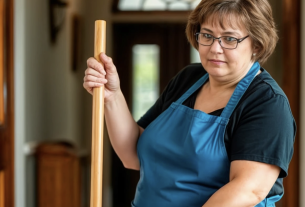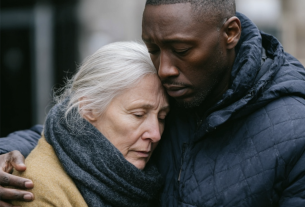Artyom stood by the fresh grave, and the world around him lost all color, turning into a damp, gray watercolor. They had just lowered the coffin with his mother, Sofya Mikhailovna, into the wet earth. He didn’t try to hold back his tears—they flowed of their own accord, hot and salty, leaving damp tracks on his unshaven, weather-beaten cheeks. Each drop was like a cry from the soul, quiet and inconsolable. The villagers, having offered their condolences, were already drifting away, their figures dissolving into the misty haze of the sullen day. And he kept standing there, as if rooted to the spot by the very roots of his grief, unable to tear his eyes from the fresh mound of earth that forever separated him from the dearest person in his life.
A bony, old finger touched his hand. The touch was light, yet full of unspoken strength and age-old wisdom.
“Come along, Artyom, come,” came the thin, quavering voice of Grandpa Yefim, a refrain to the common melody of mourning. “Stand or don’t stand—it won’t bring our Sofya back. She lived out her span—eighty-seven years. A solid number. Next year I’ll be eighty-seven myself. I don’t know how long I’ve got left to tread this Mother Earth.”
Artyom slowly turned his head, as if through a thickness of water. The eyes of the old friend, who had known even his great-grandfather, were clear and deep, like two lakes holding all the world’s wisdom. He nodded without a word and, obedient as a boy, walked beside him, matching his unhurried, shuffling step. They went in silence; only the gravel underfoot gave a dreary, creaking sound.
“You’re pushing forty, Artyom, and still a bachelor. That’s not right. Now you’ve buried your mother, you’ll be your own master and your own maid. Find yourself a mistress of the house. Your mates have long since started families, their children are growing up. And you? You’re too modest, Artyom, too quiet. Like a blade of grass in a field—you bend but don’t break. You need to be quicker about life; it runs past and doesn’t wait.”
“I know, Grandpa Yefim, I know… I’ve been thinking hard about it myself, even when Mama was still alive. She kept telling me the same,” Artyom said, his voice low and uneven. “I’ll settle it. I promise.”
At forty, Artyom, Sofya’s youngest, late-born son, endured his mother’s passing not just heavily—it was a catastrophe of cosmic scale. His two older brothers, his support and shield, had died at different times: one, a soldier, fell in a war zone; the other perished tragically in a car accident. The big, sturdy house he had built with such love and hope with his own hands for a large family now loomed over him with emptiness and a mute reproach. Until that day he had lived in a cozy, well-ordered world where his mother was his sun: she cooked, washed, filled the rooms with the aroma of fresh-baked bread and apple pies, while he tended the homestead, knowing he was always awaited. She faded quietly, like a candle: lay down to sleep and did not wake. And with her went not just the warmth from the house—the very soul of the place departed.
He and his mother had lived in full accord; he was her last hope and comfort. Though she had urged him for years to bring a daughter-in-law into the house, he could never decide what his chosen one should be like. It wasn’t that there had been no women in his life—there were fleeting romances and meetings—but things never reached a serious decision, though many of those women had hoped they would. They liked Artyom: calm, compliant, gifted with golden hands. He didn’t drink, didn’t even smoke; he was hardworking and handy—the real find.
Every village has such solitary men. Each has his own story. Some drink themselves away and eke out a miserable existence; some refuse to work or take responsibility; some are painfully shy; others are simply lazy and live off their elderly parents’ pensions.
Artyom fit none of these categories. It just happened that in his youth he didn’t meet his fate. He had relationships, but they were shallow, and time slipped through his fingers like sand. After thirty, it felt awkward to socialize with young girls, and his peers were already long married. He even stopped going to the village club—it wasn’t his place anymore, just youngsters there. And so the days flowed into years, and he remained alone with his big—far too big—house.
Now he had to make the most important decision of his life. He had experienced firsthand what true, oppressive loneliness was. A man cannot live alone, without a woman’s tenderness, without support, without the very meaning that gets him up at dawn. And he began to think seriously. He ran through in memory all the women he knew, even those from the neighboring village. But none stirred that response in his soul, that click that says: “She’s the one.” True, in the next village lived Galina, raising a teenage son; she had divorced long ago. A striking woman, good with a household. There was also Lidia the accountant, local and single, stately, but with a sharp and quarrelsome character—everyone knew it, and even Artyom, not a timid sort, was wary of her caustic tongue and a gaze that could pierce you through. She could say something that would leave the whole village scratching their heads for a week.
“I’ll go see Grandpa Yefim,” Artyom decided, staring at the ceiling of his lifeless bedroom. “He’s lived a long life and seen all sorts. He’s wise. I’ll go for advice. Maybe he’ll tell me what to do.”
Grandpa Yefim sat at a plain wooden table, sipping tea unhurriedly. He held an old saucer with a chipped edge and noisily, with relish, slurped the fragrant drink from it. He faithfully kept the old habit of drinking tea the old-fashioned way: he’d heat the samovar, brew herbs, pour it into a mug, then tip it into the saucer—to cool. It was a whole ritual, full of meaning and quiet dignity. He had buried his wife, Granny Agafya, more than ten years ago and had lived alone since, yet not lonely—his memories filled him.
“Good day, Artyom, come in, sit down,” the old man greeted first, without even seeing who had entered, as if sensing his presence with his skin.
“Good day, Grandpa,” Artyom replied, taking off his cap.
“Sit at the table; we’ll have tea. Mine’s with wild thyme and mint—healing. The mug’s on the shelf. You didn’t come to me for nothing, I feel it in my heart…”
Artyom poured himself the thick, dark tea from the singing samovar and sighed heavily.
“You’re right, Grandpa Yefim. I came for advice—how to live on. I’ve decided to marry, but I can’t for the life of me choose whom. There’s one woman I have in mind in the next village, with a child. Seems decent, good with her hands. But I don’t know if she’ll suit me. And there’s our Lida, the accountant—you know her. She’s a looker, but her temper… complicated. Very complicated. Tell me, who should I choose? Where should I settle?”
“As for Lida…” Grandpa Yefim smirked, a sparkle flashing in his eyes. “Around here she isn’t just known—she’s feared. She’s quarreled with just about the whole village. Like a chained guard dog—won’t let you pass without a bark. With her, son, your life will be bitter indeed. You’re a patient, calm man, but every patience snaps someday. You won’t stand her temper; God forbid you have such a wife.” He paused, sipping his tea, then went on seriously. “As for the one with a child, I don’t know her. But I’ll say this: she’s already been through married life, and it didn’t work out. She’ll compare you to her first husband—that’s inevitable. And she’ll always put her child first. That’s the law of nature; any mother will. You should marry a single woman without children, so you can have your own. That’s my advice.”
Artyom gazed thoughtfully at the old man’s wrinkled face, at his kind, piercing eyes.
“Well now… And who, then? A mistress of the house is needed all the same. The house is good and big; I built it for a family, for children’s laughter. I can manage the farmwork myself. Turns out getting married isn’t easy…”
“Marry Alina. You’ll be happy to the last day of your life,” Grandpa Yefim said suddenly, without any preamble.
“Alina?” Artyom nearly choked on his tea. “No, Grandpa, what are you saying! She’s… a spinster. And a redhead, and her freckles are like dew at dawn, all over her face. Probably nobody married her because of that look. Although… she’s hardworking, good-natured, responsive…”
“Look more closely at her,” the old man cut him off. “There’s nothing frightful about her. So she’s red-haired, and freckled. That just makes her one of a kind around here—bright! You’ll grow used to her freckles; they’re like little sparks of gold. When she smiles, the world gets lighter. Plainly the sun loves her, to have gifted her with such gold. And she’ll make a wonderful wife: kind, caring, faithful. Marry her, Artyom, you won’t regret it. I’ve no one else to recommend. You came for advice—there it is, from a clean heart.”
Artyom spent the whole evening pondering, turning Alina’s image over in his mind. “An old man won’t give bad counsel,” he reasoned. “I’ll take a closer look. What, have I truly not seen her at all?”
And he began to watch for her. Once he met her on the road back from the store: she was walking, bent under the weight of a grocery bag. He caught up, easily took the load from her hands.
“Hello, Alina,” he smiled, surprised himself at how easy it felt.
“Hello, Artyom,” she answered, her voice unexpectedly melodious, sing-song. And she smiled back. And he… he froze for a moment, struck. Her smile lit up everything around, as if the real sun had peeped out from behind the clouds.
“My God,” flashed through his mind. “She really does glow. And the freckles… they don’t spoil her at all—they make her… unique.”
Alina, a simple but sensitive woman, understood at once that his appearance wasn’t by chance. She was six years younger than he, and had never been married. Nor had there been men in her life. From a large, noisy family, she was the eldest daughter, and from childhood all the household chores had lain on her fragile shoulders: her parents spent their days from dawn to dusk at the kolkhoz, and she took care of her younger brothers and sisters. There was no time for dances or the club. So she remained alone, earning in the village the sad, condescending nickname “the eternal bride.”
“Listen, Alina,” Artyom ventured, his heart racing like a boy’s, “shall we take a walk this evening? Around the outskirts. We’re not teenagers anymore, but… so what? I’d like to talk with you, get to know you better. If you don’t mind, of course.”
“Why would I mind?” she smiled again, with that dazzling, sunlit smile. “I don’t. I agree.”
They walked until sunset beyond the edge of the village, and Artyom kept being surprised. Alina turned out to be a wonderful conversationalist: she told such interesting stories, quoted books he had never read—his whole life had been work, the homestead, and evening television. She, it turned out, devoured books, whole worlds stored in her head. When he said something playful, she burst into a clear, sincere laugh like the chime of crystal bells, and Artyom’s heart felt light and glad; he forgot his sorrow and loneliness.
He didn’t sleep a wink that night, tossing on his bed. That bell-like laugh rang in his head. Grandpa Yefim had been right. Old truths hold.
“She’s a good woman. Why didn’t I notice her before? Everyone kept saying ‘redhead, redhead,’ and I never really looked. She isn’t a classical beauty, but there’s so much warmth in her, so much light! And that smile… For a smile like that you could move mountains. How blind I was!”
Artyom didn’t circle the matter for long. Three months after his mother’s funeral he mustered his courage and, straightforwardly and manfully, asked Alina for her hand and heart. Gossip immediately began to crawl and buzz through the village like awakened wasps: Artyom was just amusing himself, they said, he’d court the unlucky bride and drop her—who would want such a redhead anyway?
And then—there was a wedding. Not a lavish celebration, though. The elders advised against it: too little time had passed since Sofya Mikhailovna’s funeral; it wouldn’t be right to throw a feast for the whole world. Artyom and Alina listened. Only the closest relatives and a few friends gathered in their big house. At the groom’s side, like an honored guest and confidant, sat Grandpa Yefim himself, standing in for a father.
The modest feast ended, and everyday life began. The village buzzed a while longer, picking the bones of the new family, but gradually those talks faded, replaced by surprise and quiet approval. A new, solid family had appeared in the village. Husband and wife understood each other from the very first day with half a word, with a single glance. No sooner would Artyom think of something than Alina would be doing it. He was constantly amazed at her insight and sensitivity.
She proved an excellent mistress of the house. While Artyom busied himself with chores at dawn, feeding the livestock, she was already frying him fluffy, golden pancakes and brewing fragrant tea. In the evening, after a hard day, a hot, hearty dinner awaited him. Let him stretch out on the sofa to rest, and a fresh newspaper and the TV remote would be right at hand. Alina was the embodiment of care and tenderness. Seeing such devotion, Artyom did his utmost too: he helped her, organized the household, created comfort. They lived in perfect harmony, and soon he no longer noticed the freckles or the red hair—she had become the most beautiful woman in the world to him, his one and only wife. They loved each other not with a youthful, ardent love, but with a mature, deep love that had been tested by loneliness and had found its happiness.
Before long Alina was walking around the village with a rounded belly, her famous smile shining even brighter. The villagers, looking at her, no longer said she wasn’t pretty. They saw a happy woman. Then a son was born, and they named him Antoshka (Anton). Like his mother, he was lit with sun-bright reddish curls. Taking his firstborn in his arms, Artyom said proudly:
“Now I have two little suns in my house. The two brightest, warmest suns in the world.”
The only shadow over his happiness was Grandpa Yefim’s death. The whole village buried him—everyone respected and loved the old man. His daughter came with her family; they lived far away, and Artyom had personally brought them the sad news. The village pulled together to see their wise man off on his final journey.
Life flowed on like a full-running river. A few years later Artyom and Alina had a daughter. She was the spitting image of her father, and Artyom felt a twinge of regret that she wasn’t red-haired—then there would have been three suns in the house. But you can never have too much sun—the more of it, the brighter and warmer life is.
For nothing in the world would Artyom have traded his Alina for any other woman, not even the most renowned beauty. He often said so to the neighbors, looking at his wife with adoration. And in his heart there always lived a quiet, luminous gratitude to Grandpa Yefim, who had once given him the wisest advice of his life and pointed him toward true, lasting happiness.



